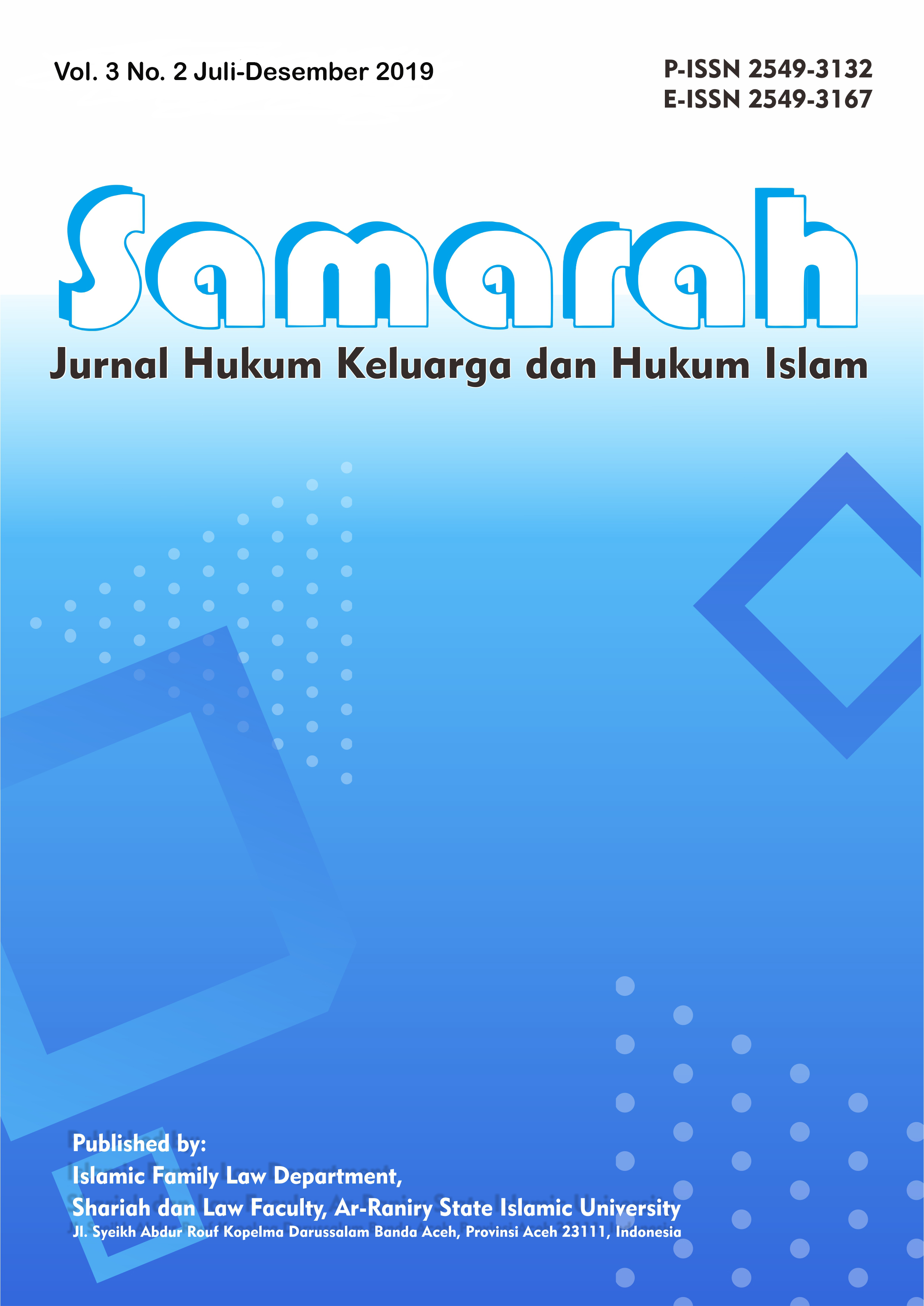Patuq dalam Tradisi Kematian Masyarakat Desa Kuta: Sebuah Tinjauan Antropologi Hukum Islam (Patuq in the Tradition of Death of Kuta Villagers: An Anthropological Review of Islamic Law)
DOI:
https://doi.org/10.22373/sjhk.v3i2.3925Keywords:
Patuq, traditions of death, anthropology of Islamic lawAbstract
Ceremonies are one of the traditional traditions that still have a value that is relevant to the needs of the Society. Religious rituals aim to seek connection with the occult world of natural rulers, this is what encourages people to perform the Ritual. On the other hand, the ritual has become a hereditary inheritance. As well as the tradition of the death ceremony in the village of Kute is a part of religious practice that is historically inspired by certain conditions both religious and local. Related to it then it can be a drum: how to practice the ritual Patuk and what are the emerging factors and the growing practice of Patuk in Kuta village in the review of the Islamic law anthopology. To answer the question of the problem, the authors use qualitative research by using anthropological approach.
References
Zayadi Hamzah, Islam dalam Perspektif Budaya Lokal (Yogyakarta: Madani Press, 1992).
Munawir Abdul Fatah, Tradisi Orang-Orang NU (Yogyakarta: PT. LkiS Pelangi Aksara, 2006).
Koentjaraningrat, Kebudayaan Jawa (Jakarta: Balai Pustaka, 1984).
M. Bambang Pranowo, Memahami Islam Jawa (Jakarta: Pustaka Alvabet, 2011).
Soekadijo, Antropologi. Jilid 2, (Jakarta: Erlangga, 1993).
Muhaimin AG, Islam dalam Bingkai Budaya Lokal; Potret dari Cirebon, terj. A Suganda (Ciputat: PT Logos Wacana Ilmu, 2001).
Koentjaraningrat: Kebudayaan, Mentalitet, dan Pembangunan & Masyarakat Desa, (Jakarta : Gramedia Pustaka Utama, 1987).
Amin Abdullah, Dkk. Mencari Islam, Studi Islam Dengan Berbagai Pendekatan, (Cet. I; Yogyakarta: Tiarawacana, 2000).
Suyono, Capt. R.P, Dunia Mistik Orang Jawa, (Yogyakarta: LKIS, 2012).
Aceng Haris Surahman, The Journey of Soul: Catatan Perjalanan Jiwa Manusia dalam Pencarian Jati Diri yang Hakiki, (Yogyakarta: Uswah, 2007).
Romdon, Kitab mujarabat, Dunia magi Orang Islam-Jawa, (Yogyakarta: Lazuardi, 2001).
Aliah B. Purwakania Hasan, Psikologi Perkembangan Islami: Menyingkap Rentang Kehidupan Manusia dari Prakelahiran hingga Pascakematian, (Jakarta: Rajagrafindo Persada, 2008).
Wawancara dengan bapak Hasan di kediaman, Tanggal 15 juli 2018.
Muhammad Tholhah Hasan, Islam dalam Perpektif Sosio Kultural (Jakarta: Lantabora Press, 2004).
Adeng Muhtar Gazali, Antropologi Agama, Upaya Memahami Keragaman kepercayaan, Keyakinan, dan Agama, (Bandung : CV Alfabeta 2011).
Dedi Ismatullah, Sejarah Sosial Hukum Islam, (Bandung: CV Pustaka Setia 2011).
Wawancara dengan Ustaz Nursim dikediamannya di Dusun Mong Lauk Desa Kute pada tgl 17 juli 2018
Wawancara Dengan bapak Hasan, Tokoh adat Desa Kute Kec. Pujut pada tgl 16 juli 2018
Wawancara dengan Laut Samudra, Tokoh Desa Rembitan Kecamatan Pujut pada tanggal 15 Juli 2018.
Wawancara dengan Laut Samudra, Tokoh Desa Rembitan Kecamatan Pujut pada tanggal 15 Juli 2018.
Siti Komisah, Modul Pengantar Sosiologi, (Jakarta: PPBAM, 2010).

Downloads
Additional Files
Published
Issue
Section
License
Authors who publish in Samarah: Jurnal Hukum Keluarga dan Hukum Islam agree to the following terms:
- Authors retain copyright and grant the journal right of first publication with the work simultaneously licensed Attribution-ShareAlike 4.0 International (CC BY-SA 4.0) that allows others to share the work with an acknowledgment of the work's authorship and initial publication in this journal.
- Authors are able to enter into separate, additional contractual arrangements for the non-exclusive distribution of the journal's published version of the work (e.g., post it to an institutional repository or publish it in a book), with an acknowledgment of its initial publication in this journal.
- Authors are permitted and encouraged to post their work online (e.g., in institutional repositories or on their website) prior to and during the submission process, as it can lead to productive exchanges, as well as earlier and greater citation of published work. (See The Effect of Open Acces)









